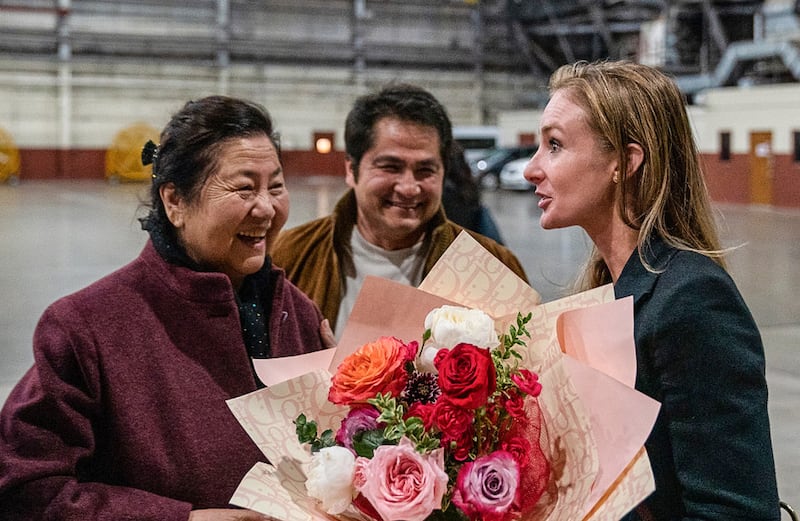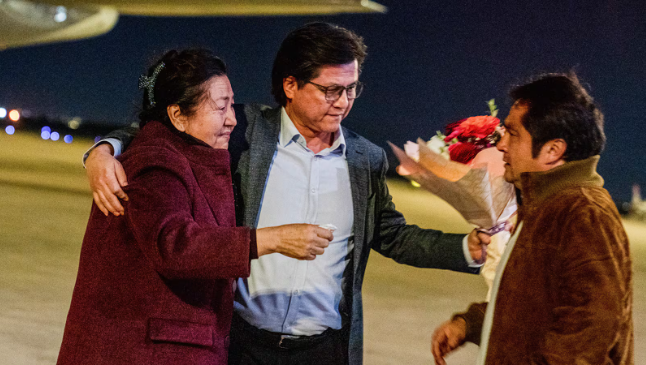‘Thank God I am here with you.’
Uyghur-American lawyer Nury Turkel hadn’t seen his mother in more than two decades. But she and two other Uyghurs, who were subjected to an exit ban in China, were included in a prisoner swap between the United States and China in November. Here, Turkel relates the story of his long-delayed reunion with his mother.
My heart is overwhelmed with joy, relief and renewed hope this holiday season. After more than 20 years of separation, I am finally reunited with my beloved mother here in America. The most precious moment was seeing her embrace her grandchildren for the first time — a long-deferred dream finally realized. For much of my life, holidays like Thanksgiving felt hollow because of our family’s fractured reality.
I have always been close to my mother. Our family often joked that I was an only child, although I have three younger brothers. My mother relied on me when she felt stressed or sad. This deep bond traces back to my birth during China’s notorious Cultural Revolution in a Communist reeducation camp.
Chinese authorities used this bond to torment me, despite my having lived in America as a free Uyghur for nearly three decades. I had not seen my mother since 2004 and had spent only 11 months with my parents since leaving China 29 years ago.

My mother, Ayshem, suffered immensely, beginning with her arrest while pregnant with me. Her “offense” was being her father’s favorite child and answering the door to his visitors, who were under the watchful eyes of the authorities in the late 1960s.
During that era of repression, her father, once an official in the short-lived Second East Turkistan Republic, became a target. Red Guards sent him to a camp and accused him of being “intoxicated with separatist ideology.”
Similarly, my father, Ablikim, an educator and public intellectual, spent three years in labor camps for having relatives across the Soviet border. His “crime” was to have been “infected with Soviet ideology.”
These family affiliations marked my parents as enemies of the state. Both were locked up in separate camps located in and around Kashgar and accused of ideological crimes.
This practice of “guilt by association” persists today, targeting those who are critical of Chinese actions and policies, serving as a harsh reminder of the enduring legacy of repression.

I was born in 1970 in the midst of unspeakable horrors. My mother had already spent over six months in the camp before my birth.
Severely malnourished and suffering from a fractured hip and ankle, she gave birth to me while in a cast from the chest down.
We lived under dire conditions, marked by scarce food and constant surveillance. I was malnourished and frail, a living testament to my mother’s suffering. The first several months of my life were spent in detention alongside her. We were starved, isolated and stripped of our dignity.
Yet, through it all, her resilience and unwavering strength sustained me through the darkest times.
In the summer of 1995, driven by a long-standing admiration for freedom in America and inspired by the end of the Cold War, I arrived in the United States as a student and was later granted asylum.
Witnessing the collapse of former Soviet blocs, including Central Asia regions with deep cultural, historical and geographical ties to the Uyghur people, reinforced my desire for freedom and higher education.
Despite my life as a free American and four years as a U.S. official, the past continued to haunt me.
I endured years of sanctioned isolation, unable to be there when my father passed away in 2022. The Chinese government’s retaliation intensified, barring my mother from traveling and isolating her socially.
My mother, facing severe health issues, remained under constant surveillance and travel restrictions. These are common sufferings and struggles for countless Uyghurs around the world.
I have been sanctioned by both China and Russia for what appears to be retaliation against my service in the U.S. government and decades-long human rights advocacy work.
Every attempt to reunite us was blocked, and my mother’s deteriorating health intensified the urgency. Yet, our determination to be together never wavered.
On the eve of Thanksgiving, a miracle unfolded.
Three days before her arrival in America, security officials in Urumqi notified my mother that she would need to get ready to go to Beijing at 4 a.m. the next day. She had about 20 hours to prepare for this trip. It was a journey she had longed for with hope and prayer for over two decades.
In her final hours in China, she visited my father’s grave to say goodbye one last time, honoring their shared history and fulfilling a deeply personal need for closure before embarking on her long-awaited journey.
They had been married for 53 years, sharing countless memories, from raising a family to weathering life’s challenges with unwavering love and commitment.
On the night of Nov. 24, around the same time Chinese security informed my mother about the trip to Beijing, I received a call from the White House notifying me about developments I would learn more about the next day at a pre-planned meeting with a senior National Security Council official. I woke up my wife and children and shared the news.
I felt relieved, excited and deeply grateful. Early on Thanksgiving morning, while driving to Dulles Airport for my flight to Texas where I was to meet my mother, I received a call from a U.S. official who put her on the phone.
“Son, I am on a U.S. government plane and free,” she said. “I don’t know what to say. So happy beyond words.”
For so long, I lived with the constant fear that one day I might receive the unthinkable news of my mother’s imprisonment — or worse — just as I lost my father over two years ago.
But when I heard my mother’s voice, hope prevailed, and the long-held darkness lifted. That fear and the unthinkable are no longer part of my life.
At the U.S. Joint Base in San Antonio, Texas, I watched my mother descend the plane’s stairs, supported by a U.S. diplomat and greeted by a military commander in uniform.
A wave of emotions washed over me, and I ran toward my mother. We embraced, tears streaming down our faces, overwhelmed by the reality of our long-awaited reunion.
Her first words — “Thank God I’m here with you, and I won’t be alone when I die” — shattered and mended my heart all at once.
This has been more than a reunion. It’s the restoration of a piece of my soul. Words cannot fully express my gratitude.
On Thanksgiving morning, my brother, who had flown with me to Texas, and I brought our mother to Washington. Watching her embrace her grandchildren for the first time was a moment of incredible joy and healing. Though my father didn’t live to see this day, I felt his presence, his spirit guiding us toward this long-awaited reunion.
The privilege of my children knowing their grandmother is a gift that begins to heal the wounds of our family’s long separation. It bridges a gap that has weighed on my heart for two decades. I am forever grateful to my country.
America has given me everything — my freedom, my livelihood and now the joy of seeing my children play with their grandmother.
I am deeply grateful for the tireless efforts of Secretary of State Antony Blinken, Ambassador Nick Burns, National Security Adviser Jake Sullivan, Senior Director for China Sarah Beran, and countless U.S. national security officials who championed our cause across four presidential administrations.
Our family reunion should serve as a beacon of hope for thousands of Uyghurs around the world, including members of Radio Free Asia’s Uyghur Service, whose loved ones were forcibly taken to camps in China — seemingly in retaliation for their service to the American people.
May this moment inspire renewed efforts to reunite all separated families and restore the dignity and freedom they deserve.
Nury Turkel is a lawyer and the award-winning author of “No Escape: The True Story of China’s Genocide of the Uyghurs.” He serves as a senior fellow at the Hudson Institute and is an advisory board member of the Krach Institute for Tech Diplomacy.
Edited by Jim Snyder and Boer Deng.

